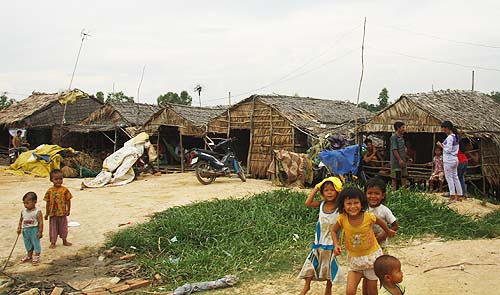Their ancestors were originally Vietnamese people who sailed hundreds of kilometers along rivers from Vietnam to Tonle Sap lake in Cambodia and settled in floating houses to earn their living by catching fish.
Part 1: The fate of Vietnam’s Tonle Sap villagersPart 2: Mishaps on the way backPart 3: A life-long dilemmaPart 4: The villagers with borrowed names
Though many generations of these Vietnamese emigrants have lived on the lake, they have received no personal paper from either Cambodian or Vietnamese authorities. As a result they are no different from stateless people.
Around five generations of such ‘overseas Vietnamese’ have survived on the lake.
But the recent exhaustion of fish in Tonle Sap, which was once a prime breeding ground, has discouraged them from continuing to attach their lives to the lake. However, returning home to Vietnam means a new phase of integration, as they have forgotten their native land.
Beginning a new life
Recently these emigrants have returned to Vietnam in increasing numbers and set up temporary houses along canals and rivers near the border between the two countries. Most have nothing but a boat and their fishing nets.
Long An Province, in the Mekong Delta, hosts the most returnees, over 1,700 individuals in 424 households, mainly living in districts as Tan Hung, Vinh Hung, Moc Hoa, and Tan Thanh.
The entire Mekong Delta region has over 8,000 ‘Tonle Sap overseas Vietnamese’ in 2,644 households.
Generally, they are willing to do anything to earn money. They mainly do seasonal jobs in rice fields such as sowing, cutting, and carrying rice plants. When it is not rice harvesting season, they collect ‘lục bình’ -- a floating aquatic plant commonly known as Water Hyacinth that grows on rivers – and dry it for materials for handicrafts.
They dry this luc binh along strips of fallow land lining canals under the scorching sun. Behind these are lines of low huts made of coconut tree leaves and nylon sheets.

They collect luc binh and dry it for materials for handicrafts (Photo: Tuoi Tre)
Tuoi Tre journalists visited a hut built by Mr. Nguyen Van Nghi in Tuyen Binh Commune, Vinh Hung District. Mr. Nghi said, “My whole life was spent on a boat in Tonle Sap. I got used to hunching my back. So I set up this hut with a low ceiling.”
Upon seeing strangers in their ‘village’ which is largely isolated from other residential areas, neighbors came to the hut to talk and greet the visitors. They speak outdated dialects of the southern region of Vietnam, which their ancestors left almost a century ago.
When asked about her homeland, Ms. Nguyen Thi Dep, 77, said, “My homeland is at sea [Tonle Sap].”
This is because she does not know what part of Vietnam her family is from, though she knows her ancestors left Vietnam long ago. This is common among the returnees. Only a few of them can remember their grandparents saying their homeland was Dong Thap, or An Giang, or some other province in the Mekong Delta.
They admitted they have never visited their home land.
But this is not their biggest concern. That would be the immediate worry of having rice for daily meals.
Holding his five-year old daughter on his lap, Nghi told Tuoi Tre, “She is now the main laborer in my family. Together with around 20 other children from this village, she gets up at 5:00 every morning and takes a bus to Moc Hoa to hawk lottery tickets.
“The profit from her job is enough to buy two or three liters of rice a day.”
To Van Chanh, chairman of the People’s Committee of Tuyen Binh Commune, told Tuoi Tre, “Not one of the 131 returnees from 24 households in this commune has identification papers granted by either Vietnam or Cambodia.”
“Only six of the households were given permanent residence status as they remember their home provinces after verification.
“They are of the fourth or fifth generation since their ancestors left here,” Chanh added.
They returned to Vietnam by different means, but share a common reason: the inability to continue living on Tonle Sap.
Do Van Tha, a 75 year old fisherman, said that fish and shrimp now is only three tenths of the past.
Poverty, a lack of access to education, and the failure to integrate into the local community in Cambodia have forced them to return.

A temporary hut of the Tonle Sap returnees (Photo: Tuoi Tre)




















































